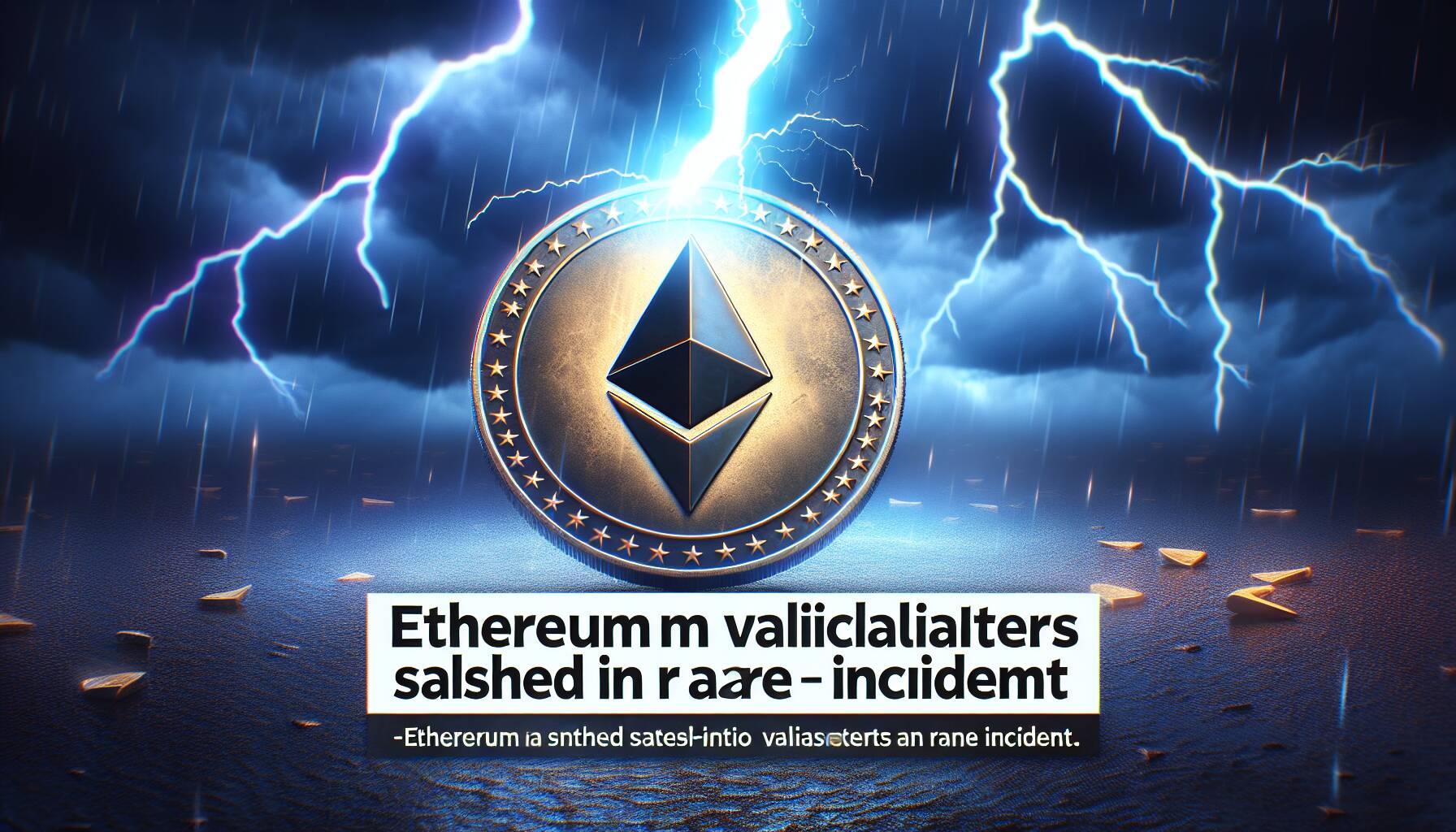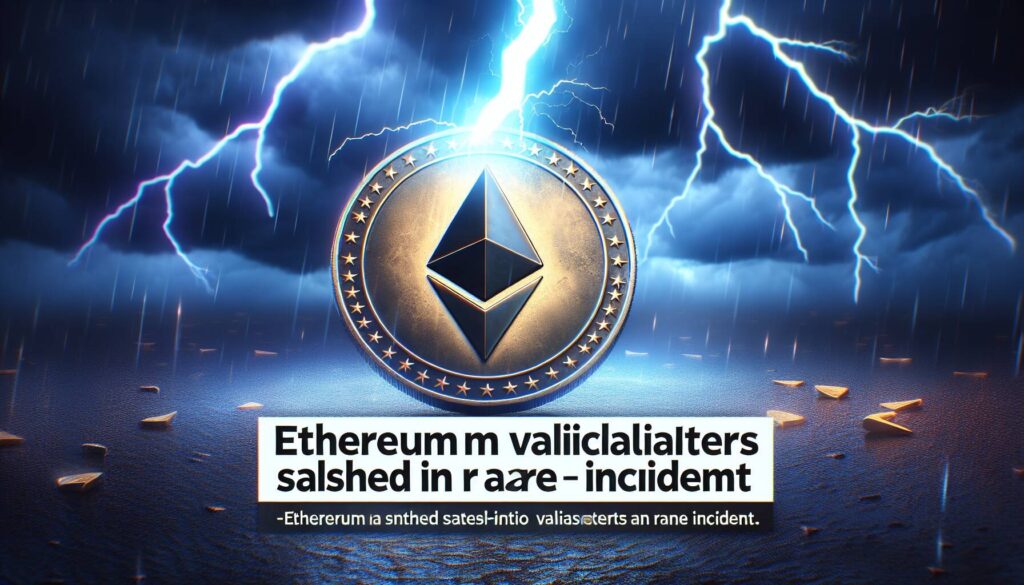On Wednesday, Ethereum witnessed a significant incident as 39 validators were penalized in a rare slashing event, as reported by blockchain explorer Beaconcha.in. This occurrence was linked to the SSV Network, a distributed validator technology (DVT) protocol designed to decentralize staking infrastructure by distributing validator keys among several operators. Despite the scope of the event, SSV founder Alon Muroch reassured stakeholders that the protocol itself remains secure, with the penalties instead arising from problems on the operator side, particularly involving third-party staking providers utilizing SSV.
One noteworthy group of slashed validators was associated with Ankr, a provider of liquid staking services. Muroch indicated that an issue related to routine maintenance on Ankr’s systems prompted the slashing. Additionally, another set of validators that had transitioned from Allnodes two months prior faced penalties due to a problematic secondary validator setup, which resulted in duplicate signing. In total, this incident marks one of the largest correlated slashing events since the Ethereum network shifted to a proof-of-stake system, underlining the importance of robust operational practices.
“Validator safety hinges as much on infrastructure and operator diligence as on the protocol itself,” emphasized Muroch, highlighting the critical lesson from this event.
Each validator that was slashed incurs immediate ETH penalties and may also encounter inactivity leaks, leading to compounded losses. To illustrate the financial impact, one affected validator, with a stake of 2,020 ETH, suffered a loss of approximately 0.3 ETH, translating to around $1,300 at current prices. While slashing acts as a safety mechanism against malicious or negligent behavior within the network, it remains a rare occurrence; fewer than 500 validators out of over 1.2 million have faced slashing since the Beacon Chain’s launch in 2020. Most incidents, including this recent one, have stemmed from operational errors rather than malicious intent.
With the Ethereum ecosystem evolving, this event serves as a reminder of the vital role of diligence in the staking infrastructure, where operator mismanagement can lead to significant penalties, even in a secure protocol environment.

Ethereum Slashing Event: Key Points
Key aspects of the recent Ethereum slashing event that may impact readers:
- 39 Validators Slashed: A rare occurrence with significant consequences for the involved parties.
- SSV Network Involvement: The distributed validator technology used to decentralize staking could impact overall staking safety.
- Operator-side Infrastructure Issues: The penalties arose from problems with third-party staking providers rather than the protocol itself, highlighting the importance of reliable infrastructure.
- Ankr and Allnodes Issues: Slashing events were tied to infrastructure maintenance by Ankr and the setup of a secondary validator from Allnodes, influencing how validator migrations should be managed.
- Financial Penalties: Slashed validators faced immediate ETH penalties and potential inactivity leaks, showing the risks involved in staking.
- Rarity of Slashing: With fewer than 500 of over 1.2 million validators slashed since 2020, this incident emphasizes the need for caution despite the low frequency of slashing events.
- Correlated Misbehavior Penalties: Mass slashing events cause amplified penalties due to inactivity leaks, underscoring the need for collective diligence among validators.
- Importance of Operator Diligence: The event highlights that the safety of Ethereum’s staking ecosystem depends as much on infrastructure as on protocol security.
Understanding these factors is crucial for anyone interested in Ethereum staking, as it emphasizes the importance of both technical setup and operational oversight.
Ethereum Slashing Incident: Implications for Staking Providers
The recent slashing event involving 39 validators on the Ethereum network highlights significant issues within the staking infrastructure, particularly relating to third-party providers. While the SSV Network, a decentralized validator technology, maintains the integrity of the protocol, the incident sheds light on vulnerabilities created by operator-side lapses. This situation mirrors past events in the blockchain space where reliance on external systems led to unexpected penalties and losses.
Competitive Advantages: The SSV Network’s decentralized nature offers a layer of security that can potentially shield against active attacks, suggesting it serves as a more resilient option for validators compared to centralized staking solutions. Furthermore, SSV’s technology empowers validators to spread their risk across multiple operators, which could be a draw for those wary of centralized dependencies.
Disadvantages: However, this incident reveals the inherent risks associated with third-party staking providers, where a failure in their systems can trigger extensive financial penalties for validators. Such correlated misbehaviors, as evidenced by the mass slashing, can breed distrust among potential validators considering uneven operator performance.
This situation could serve to benefit well-structured and reliable staking providers that prioritize infrastructure testing and operational oversight, enhancing their appeal in a market wary of slashing incidents. On the other hand, providers like Ankr and Allnodes may face reputational challenges stemming from the fallout of this event, complicating their relationship with validators and potentially leading to a loss of clientele. Overall, the ramifications of such mass slashing episodes serve as a critical reminder of the diligence required in validator operations and the impact of infrastructure reliability on the wider Ethereum ecosystem.

















